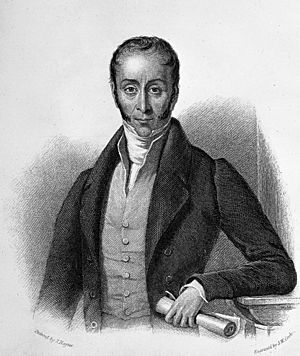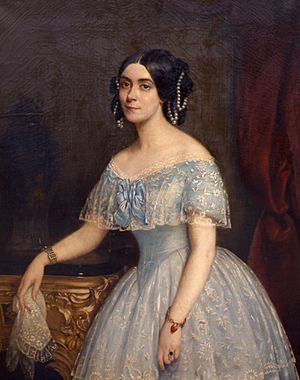William Alexander Mackinnon (Dunwich MP) facts for kids
Quick facts for kids
William Alexander Mackinnon
|
|
|---|---|
 |
|
| Member of Parliament for Rye | |
| In office 1853–1865 |
|
| Preceded by | William Alexander Mackinnon |
| Succeeded by | Lauchlan Mackinnon |
| Member of Parliament for Lymington | |
| In office 1835–1852 Serving with John Stewart, Hon. George Keppel, Edward John Hutchins
|
|
| Preceded by | Sir Harry Burrard-Neale John Stewart |
| Succeeded by | Edward John Hutchins Sir John Rivett-Carnac |
| In office 1831–1832 Serving with George Burrard
|
|
| Preceded by | George Burrard William Egerton |
| Succeeded by | Sir Harry Burrard-Neale John Stewart |
| Member of Parliament for Dunwich | |
| In office 1819–1820 Serving with Michael Barne
|
|
| Preceded by | Michael Barne The Lord Huntingfield |
| Succeeded by | Michael Barne George Henry Cherry |
| Personal details | |
| Born | 2 August 1789 Broadstairs, Kent |
| Died | 30 April 1870 (aged 80) |
| Political party | Whig, Liberal |
| Spouses |
Emma Mary Palmer
( |
| Relations | Douglas Cochrane, 12th Earl of Dundonald (grandson) Thomas Cochrane, 1st Baron Cochrane of Cults (grandson) |
| Children | 6, including William Jr., Lauchlan |
| Alma mater | St John's College, Cambridge |
William Alexander Mackinnon (born August 2, 1789 – died April 30, 1870) was a British politician. He was also involved in setting up the colony of South Australia.
Contents
William Alexander Mackinnon: A British Politician
William Alexander Mackinnon was an important figure in British politics during the 1800s. He was a Member of Parliament (MP) for several areas. He also worked to improve animal welfare.
Early Life and Family
William Alexander Mackinnon was born in Broadstairs, Kent, in 1789. He went to St John's College, Cambridge for his education. His parents were William Mackinnon and Harriet Mackinnon. His brother was Lieutenant Colonel Daniel Mackinnon.
In 1809, William became the 33rd Chief of the Clan Mackinnon. This was an important leadership role in his family's Scottish clan.
His Political Career
William Alexander Mackinnon was a politician for many years. He belonged to the Whig party, and later the Liberal party.
He served as an MP for different places:
- Dunwich from 1819 to 1820.
- Lymington from 1831 to 1832, and again from 1835 to 1852.
- Rye from 1853 to 1865.
He was also one of the people who signed a report for the Colonisation Commissioners of South Australia. This group helped plan and set up the new colony.
Elections and Family in Politics
In the 1852 election, William lost his seat in Lymington. However, his son, William Alexander Mackinnon Jr., had won the election in Rye. But there was a problem with the election in Rye, and his son's win was cancelled.
So, in May 1853, the elder William Alexander Mackinnon ran in a special election (called a by-election) for the Rye seat and won. When he retired in 1865, his other son, Lauchlan Bellingham Mackinnon, took over the seat.
Helping Animals: The RSPCA
William Alexander Mackinnon cared a lot about animals. He was a J.P. and a Deputy Lieutenant of Middlesex. He used his position to help improve animal welfare laws.
In 1837, he became the vice-chairman of the RSPCA (Royal Society for the Prevention of Cruelty to Animals). In 1858, he led their annual meeting.
The RSPCA's Early Work
The RSPCA was started in London in 1824. At first, it focused on stopping cruelty in meat markets. But its goals grew much bigger. People like William Alexander Mackinnon wanted to stop cruel sports in Britain and tackle animal cruelty around the world.
William Alexander Mackinnon was very important to the RSPCA. The Society couldn't make laws on its own. It needed MPs like him to propose new laws in Parliament.
New Laws for Animal Protection
Mackinnon presented a bill to Parliament to improve laws about how animals were treated. This first attempt didn't pass. But it led to him working with Joseph Pease, another MP who was also on the RSPCA Committee.
Together, they created a new bill. This bill became the Cruelty to Animals Act of 1835. It was a huge step forward! This law made it illegal to use public or private places for fighting animals like bulls, bears, badgers, or dogs.
Other Achievements
William Alexander Mackinnon was elected a Fellow of the Royal Society in 1827. This is a very respected group for scientists. He wrote a paper about how chalk and limestone absorb moisture from the air.
He was also a fellow of the Society of Antiquaries. This group studies history and old things. He was the chairman of the Furness Iron and Steel Co. when it started in 1866. He also wrote three books: "Thoughts on the currency question," "Public Opinion," and "The history of civilisation."
His Family Life
William Alexander Mackinnon was married to Emma Mary Palmer. They had three sons and three daughters before Emma passed away in November 1835.
Their children included:
- Emma Mary Mackinnon (1811–1891), who married Antoine Alfred Agénor, the Duke of Gramont. He became the Foreign Minister for France.
- William Alexander Mackinnon (1813–1903), who also became an MP, just like his father.
- Lauchlan Bellingham Mackinnon (1814–1877), who was a captain in the Royal Navy and wrote books.
- Louisa Harriet Mackinnon (around 1820–1902), who married Thomas Cochrane, 11th Earl of Dundonald.
- Daniel Lionel Mackinnon (1824–1854), who sadly died in battle in 1854.
When his wife's father, Joseph Palmer, passed away, William inherited his estates. These included lands near Dalton in Furness.
 | Victor J. Glover |
 | Yvonne Cagle |
 | Jeanette Epps |
 | Bernard A. Harris Jr. |


